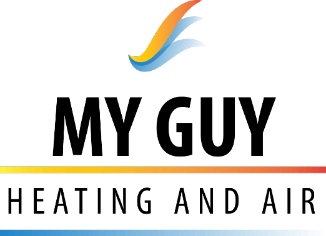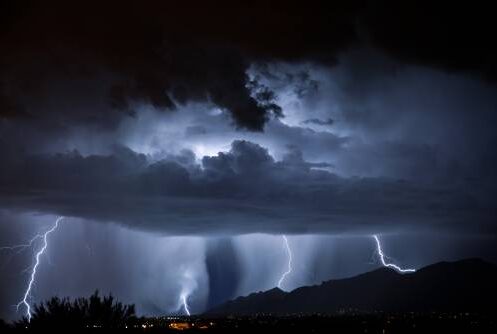Summer storms are part of life in many parts of the country, but they can be a real issue in northern Colorado. While these storms often provide a break from the heat, they might wreak havoc on your home’s electrical system. Lightning strikes, downed power lines, and power surges all pose risks to your air conditioner. If your AC goes down during a heatwave, it can impact your family’s comfort.
By planning ahead and taking preventive steps, you can minimize risks and keep your cooling system running reliably during summer storms. This guide will cover what you need to know to protect your air conditioning unit and prevent unnecessary damage or downtime.
Install a Surge Protector for Your HVAC System
Power surges are one of the leading causes of AC failure during storms. A direct lightning strike isn’t necessary; a surge in the electrical grid from nearby lightning or utility disruptions can send a high-voltage spike into your home. Sensitive components, like the compressor, capacitor, and control board, can burn out instantly. Surge protection is a low-cost investment that prevents expensive repairs or the need to replace your entire system.
To protect your home against large external surges, install a whole-home surge protector at your main electrical panel. Add a dedicated HVAC surge protector on your outdoor condenser unit for an additional layer of defense. For added security inside your home, you can also plug thermostats or mini-split controls into surge-protected outlets. A battery backup is also an option for wall-powered devices.
Use a Smart Thermostat With Power-Loss Recovery
Smart thermostats offer more than energy savings; they also help your system recover faster after a power outage. Many newer models feature automatic power-loss recovery. This lets you restore your existing settings and continue normal operation after power comes back, reducing the chances of system confusion or restart problems.
If you don’t have a smart thermostat, upgrade to one that includes automatic recovery or offline memory. Ensure that your settings include reasonable time delays for restarting after outages, which can prevent the compressor from overloading. If your system does not restart after an outage, avoid repeatedly flipping the breaker to get it to start back up. Let the system rest for 5 to 10 minutes and check your thermostat settings before attempting it again.
Keep the Outdoor Condenser Clear of Debris
Heavy wind and rain can blow sticks, leaves, and other debris into or around your outdoor condenser unit. If this debris restricts airflow, the system can overheat or shut down completely. Trim back bushes, shrubs, and branches that are close to the condenser. There should be at least a 2 to 3-foot clearance from the outdoor unit.
Check the area around the condenser after every storm and remove any debris that could block airflow. Large sticks also increase the chance of damaging the fan blades. Routine visual inspections go a long way toward protecting your unit’s physical condition and performance. If flooding is common in your area, consider elevating the unit on a concrete pad or installing a drainage solution to prevent standing water.
Shut Off Your Air Conditioner Before Storms Hit
If a strong storm is in the forecast and you’re able to shut off your AC in advance, you can lower the risk of damage from power surges and voltage fluctuations. Turning the system off prevents it from being mid-cycle during a spike or outage, which is when most damage happens.
Turn off your AC at the thermostat and switch off the dedicated HVAC breaker in your control panel. Wait until the storm passes before restoring power, allowing 5 to 10 minutes for the system to stabilize. This proactive step is useful when you’re away from home during a storm. Smart thermostats allow you to turn off the system remotely to prevent issues while you’re gone.
Have a Backup Power Plan
If you live in an area prone to power outages, a backup power plan helps keep your system running during an extended outage. While most portable generators can’t power an entire cooling system, they can keep you cool in other ways.
Invest in a whole-home generator if you frequently lose power and need to keep your air conditioner operational. You can expect a whole-home generator to:
- Provide continuous power during outages
- Protect critical systems in your home
- Turn on within seconds of power failure
- Prevent food from spoiling
- Power appliances and lighting in your home
For smaller outages, use a portable generator to power essentials like fans, mini-splits, or a window unit. Always follow proper safety guidelines when you are using a generator, meaning that you should never operate it indoors or near open windows. A backup power solution is a great way to protect loved ones with heat-sensitive conditions during power outages.
Schedule Maintenance Before Storm Season
Preventive maintenance helps ensure your air conditioner is in tip-top shape going into summer. At My Guy Heating and Air, LLC, we suggest scheduling routine maintenance during the spring when your cooling system is not yet a requirement. This will also ensure that it is more resilient during power surges or mechanical stress caused by unpredictable weather.
Schedule a professional AC tune-up with our team at My Guy Heating and Air, LLC so that we can inspect electrical components, refrigerant levels, and drainage. We can also check the capacitor and contactor, which are particularly vulnerable during surges. Ensuring that drain lines are clear to prevent clogs and overflow during storms. A well-maintained system is less likely to suffer mid-season failures, even when conditions outside become unpredictable. Our Comfort Membership makes scheduling tune-ups easy and comes with perks and money-saving discounts.
Contact My Guy Heating and Air, LLC today!
Watch for After-Storm Warning Signs
Just because your AC powers back on after a storm doesn’t mean everything’s operating normally. Storm-related damage isn’t always immediate or obvious. High winds, lightning strikes, power surges, and even brief flooding can all affect your system’s internal components, sometimes in ways that show up days later.
That’s why it’s important to pay close attention to how your system performs in the hours and days following a storm. After a storm, listen closely when your AC kicks on. Sounds that weren’t there before, such as buzzing, rattling, hissing, or clicking, could signal an issue. If your cooling unit is short-cycling, a surge may have affected the electrical controls or the sensors.
Your Reliable HVAC Company in Northern Colorado
Summer storms may be unpredictable, but your AC system does not have to be. By installing surge protectors, clearing debris, upgrading to a smart thermostat, and maintaining regular upkeep, you can minimize the risk of storm-related damage to your home. A backup power plan provides added peace of mind when power outages are common. Your air conditioner is essential for keeping your home safe and comfortable during extreme heat. Taking the right steps helps you stay cool, even when the skies open up.
As a top cooling company in the Longmont and Firestone area, we take your comfort seriously. Trust us to provide you with exceptional service. Contact My Guy Heating and Air, LLC today for all of your heating and cooling needs!




